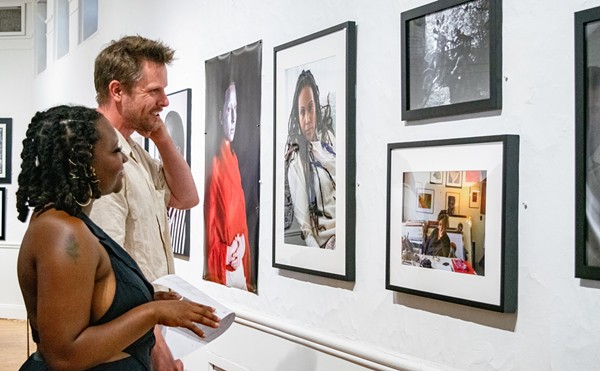Taqueria la Tapatia is a no-frills kind of place. A metal cage safeguards the front door, a grill smokes and sizzles just behind the counter, and the menu items are numbered and pictured on a backlit display like those found in coney islands and chop suey takeouts. The taqueria, at 4314 W. Vernor, is a hub for the residents of this predominantly Hispanic neighborhood on Detroit’s southwest side. They gather in the dim, narrow dining room to relish such Old Mexico delicacies as handmade tortillas, birria (barbecued goat), horchata (sweet rice milk), and lengua (beef tongue).
It’s probably not the kind of place that you’d expect to be on the cutting edge of technology.
But Dr. Jorge Vazquez wants to change that.
Vazquez, along with his family’s Troy-based IT firm 4-Serv, is working with la Tapatia and Dearborn computer educators Professor PC to provide public computer access and free, bilingual computer classes at the restaurant. They plan to transform la Tapatia into Detroit’s first “cyber-taqueria.”
“We have cyber-cafés all over the place,” Vazquez says. “People in suburban areas take it [Internet access] for granted. It’s like second nature. But in the inner cities, it’s not. There’s no access.”
Vazquez says the taqueria is an ideal environment in which to bring computer education to the Hispanic community. Unlike institutions such as public schools — which, he says, working-class Hispanics often distrust and avoid — the taqueria is a place where neighborhood residents feel at home.
“We asked ourselves where would be most effective. We chose the taqueria because it’s a place of leisure, where the clientele is more relaxed, more open. It’s a social place.”
The program aims to bring basic computer and Internet education to working-class people who have little or no promise of career advancement. Vazquez is convinced that computer skills are key to economic empowerment.
“Our people for 500 years were under the oppression of the Spaniards, brainwashed, trained to think very limiting thoughts, to accept misfortune as part of life,” he says. “Still we feel it in our working-class people, the acceptance of someone else dictating their lives, instead of us realizing that we are owners of our own destiny. We don’t need another 500 years of conquistadores oppression. As society evolves into the information age, you know, if we don’t impact people, give them the knowledge base to control their economic destinies, we’re going to have another 500 years of e-oppression.”
4-Serv donated the computers and will assume responsibility for their upkeep. Professor PC — which, like 4-Serv, is Hispanic-owned and operated — will provide instruction in basic computer, Internet and e-mail use.
The free classes will accommodate workers’ schedules, with late-evening and weekend sessions. Instruction will be conducted in both Spanish and English.
The program’s introductory phase, says Vazquez, will be run on an informal, first-come, first-served basis, with no sign-up required. “The idea is for people to come eat, listen and learn.”
In the second phase, formal classes will be organized. These classes, Vazquez emphasizes, “will be open to the Hispanic community at large — anyone, regardless of legal status, will be welcome.”
In the final phase of the program, the instructors will identify promising students to participate in a government-sponsored scholarship program to provide higher-level training in programming, network engineering and equipment maintenance and repair.
At la Tapatia, the four Toshiba PCs donated by 4-Serv are arranged in a dark, quiet room adjacent to the main dining area. They sit beneath a painting of Juan Diego adoring the Virgin of Guadalupe and a photo of a Mexican movie star.
Though the free classes haven’t started, the computers are available for Web surfing and word processing. They’ve attracted attention: “A lot of people are interested,” says waitress Monica Martinez. “People ask about them all the time.”
Vazquez, who earned a Ph.D. in clinical psychology in his native Bolivia, has lived in Michigan for 12 years. For the past decade he’s been the director of marketing at 4-Serv, which was founded by his brothers Antonio and Juan in 1985. Though his home is in Troy, he considers himself to be a part of southwest Detroit’s Hispanic community. His relationship with la Tapatia goes back several years, to when it was one of the few authentic Mexican-style taquerias in the area. He used to go there with his Mexican-American wife, he says, so she could get a taste of home.
The cyber-taqueria program, Vazquez says, is his family’s way of contributing to the Hispanic community. “As we have been successful and fortunate, we have a responsibility to give back.”
Nevertheless, he points out, such contributions are not just good corporate citizenship, but also good business.
“It’s not an obligation,” he insists. “Hispanics have evolved from being a niche market to being a major consumer power. So all of a sudden it’s fashionable to be Hispanic; we’ve been targeted by big companies. Hispanics are spending over $500 billion — we’re consuming a lot.
“And,” he laughs, “it’s not anymore, you know, just diapers, baby food, used cars without mufflers. We’re buying Mercedes, Jaguars too.
“The rules have changed. As Hispanics buy more, it’s in corporate America’s best interest to support the Hispanic community. The relationship is encompassed in the phrase ‘Hoy por ti, mañana por mi,’ today for you, tomorrow for me, I help you today, you help me tomorrow. In the business sense, it’s today for you, tomorrow for both of us.”
Call Professor PC at 313-359-2970 for information on class schedules.
Ian M. LeBlanc is an editorial intern at Metro Times. E-mail [email protected]




